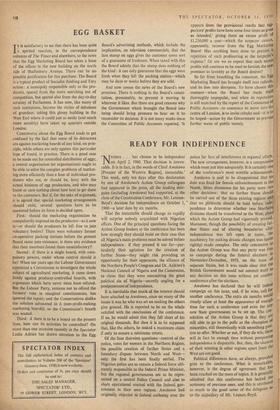READY FOR INDEPENDENCE
IGERIA . . . has chosen to be independent on April 2, 1960. That decision is irrevo- cable. It is in fact, in the words of Chief Awolowo [Premier of the Western Region], immutable.' This week, only ten days after this declaration by one of Awolowo's Action Group colleagues had appeared in the press, all the leading dele- gates (including Awolowo) had supported, at the close of the Constitution Conference, Mr. Lennox- Boyd's decision for independence on October 1, 1960—a later date by six months.
That the immutable should change so rapidly will surprise nobody acquainted with Nigerian affairs. One of the principal questions facing the Action Group leaders at the conference has been how strongly they should insist on their case that all Nigeria's main problems must be solved before independence : if they pressed it too far—par- ticularly their agitation for the creation of further States—they might risk providing, an opportunity for their opponents, the alliance of the Northern People's Congress and Dr. Azikiwe's National Council of Nigeria and the Cameroons, to claim that they were committing the great political sin of Nigeria—secretly angling for a postponement of independence.
It is inevitable that much of the interest should have attached to Awolowo, since on many of the issues it was he who was set on making the others give ground. He is reported to be on the whole satisfied with the conclusions of the conference. If so, he would admit that they fell short of his original demands. But then it is to be supposed that, like the others, he staked a maximum claim if only to ensure a minimum return.
Of the four thorniest questions—control of the police, votes for women in the Northern Region, the possible creation of further States and a boundary dispute between North and West— only the first has been finally settled. The Nigerian police are to remain a federal force ulti- mately responsible to the federal Prime Minister, but the regional governments are to be repre- sented on a central Police Council and also to share operational control with the federal gov- ernment in their own regions. Awolowo had originally objected to federal authority over the police for fear of interference in regional affairs, The new arrangement, however, is a compromise which must suit him adequately. It is certainly one of the conference's most notable achievements.
Awolowo is said to be disappointed that no date was fixed foi female enfranchisement in the North. More disastrous for his party were two other decisions : that no further States should be carved out of the three existing regions and that no plebiscite should be held before inde. pendence to determine whether two NorthertA$ divisions should be transferred to the West, pleas' which the Action Group had vigorously pressed. Moreover, though the possibility of creating fur- ther States and of altering boundaries after independence was left open in name, the machinery for making drastic changes was (quite rightly) made complex. The only concession to the Action Group was that any party was free to campaign during the federal elections in November-December, 1959, on the issue oil separate States, but it was made clear that the British Government would not commit itself to any decision on this issue without yet another conference after the elections. Awolowo has declared that he will indeed campaign on this issue, and, if he wins, call or another conference. The extra six months would clearly allow at least the appearance of enough time for such a conference and even for anY new State governments to be set up. The con- solation of the Action Group is that they are . still able to go to the polls as the champion or minorities, still theoretically with something posi- tive to offer. Whether or not, if they do win, there will in fact be enough time without postponing independence is disputable. But, then, the chances of their winning in other regions apart from the West are not good. Political differences have, as always, provided grist to the conference. What is remarkable, however, is the degree of agreement that has been reached on the mass of topics. It is generally admitted that this conference has lacked the. acrimony of previous ones, and this is attributed as much to the good sense of the delegates as to the midwifery of Mr. Lennox-Boyd.


































 Previous page
Previous page